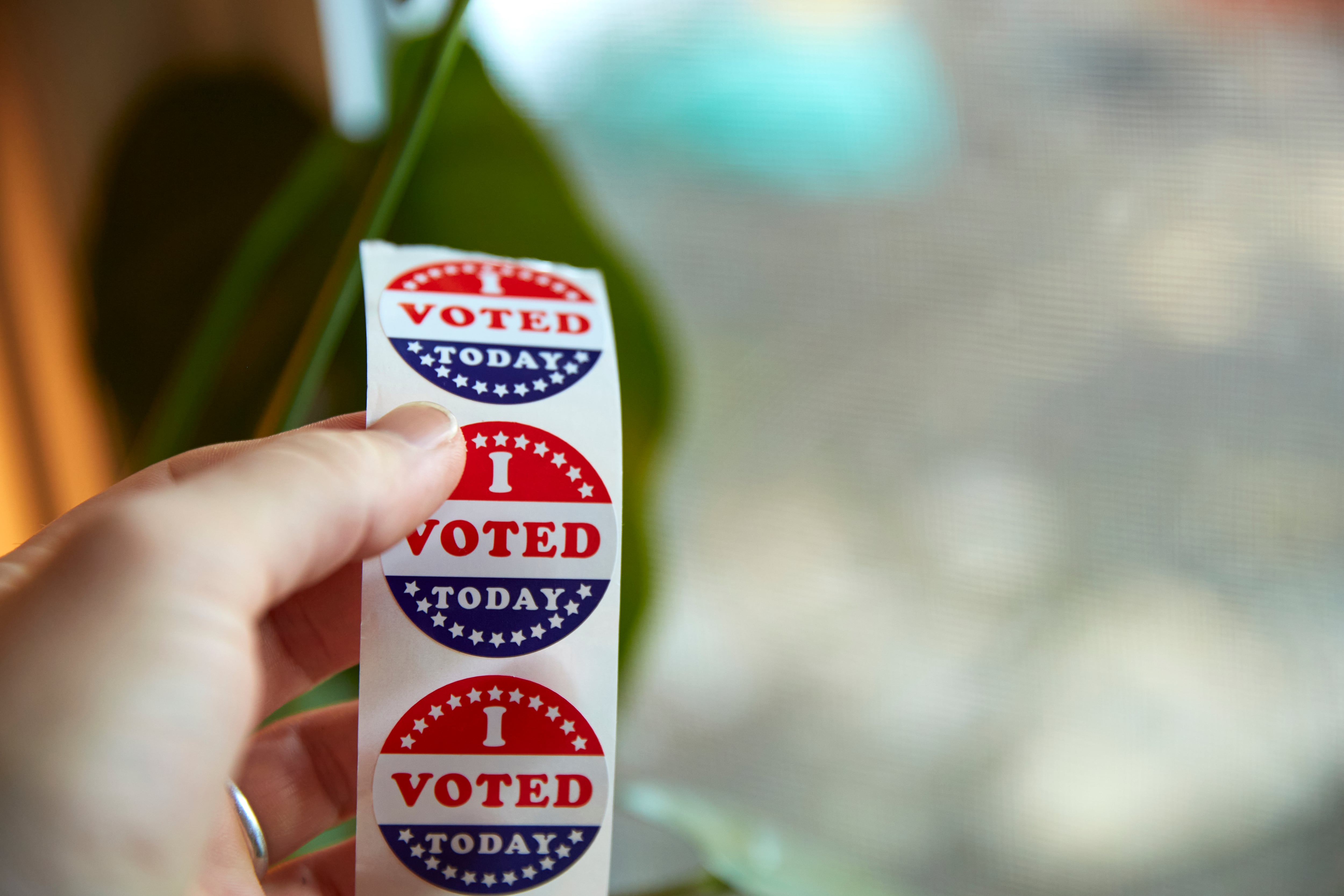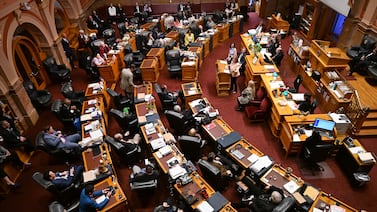Sign up for Chalkbeat Indiana’s free daily newsletter to keep up with Indianapolis Public Schools, Marion County’s township districts, and statewide education news.
Update: The Indiana legislative session ended on March 8, 2024. Here are the education bills that did and didn’t pass.
In Heather Veatch’s fourth grade class at East Washington Academy in Muncie, students run for office at the beginning of the year.
Despite their nerves, they each give a speech to their peers introducing themselves and their ideas and then vote for president, vice president, senators, and representatives. Veatch’s students bring issues to their elected leaders, who work to address them.
This year, they campaigned for and successfully passed a proposal for a new sensory space, which Veatch then granted.
While those who don’t win the class elections are often disappointed, Veatch tells them that they’re now occupying the most important role of all — citizen.
“Kids at a young age need to know they’re part of a bigger picture,” she said. “They’re not just them alone. But they alone can have a big impact on the bigger picture.”
This is the kind of civics education that Indiana leaders hope to see more of under new bills that would reward students, educators, and schools for engaging the next generation of Hoosier voters.
While Indiana has made progress in civics education through new standards requiring a semester of civics in sixth grade, advocates say there’s still work to be done, especially as the state faces a “concerning” drop in voter participation, according to one report.
House Bill 1137 and Senate Bill 211 would each establish a civics seal to recognize students, teachers, and schools for excellence in civics education — which could look like offering civics-minded lessons and field trips to students.
Students could receive the seal on their diplomas, while schools could earn a certification, similar to existing recognition for STEM education.
The bills also seek to increase access to civics material in the earliest grades as part of the state’s push to provide young students with high-quality reading curriculum. And by introducing basic concepts of citizenship and fairness early, advocates hope to build a foundation for improved civic engagement later in life.
“We don’t want to lose social studies standards in the push for science of reading,” said David Roof, a professor and director of the Center of Economic and Civic Learning at Ball State University. “The focus on literacy and the focus on civics don’t need to compete. They should be intertwined.”
While the civics provisions earned widespread approval, each bill also comes with less popular provisions.
Civics education to improve civic engagement
Civic engagement in Indiana has been persistently low, according to the Indiana Civic Health Index, a report compiled by the Center for Urban and Regional Excellence at Indiana University Northwest.
The center’s 2023 survey found Indiana ranked second to last in voter turnout in the 2022 midterm election, with around 42% of voters voting. While turnout nationally is the highest it’s been since the 1980s, Indiana’s rate has dropped nearly 15 percentage points during that time, the report notes.
Common theories about this drop include the absence of contested elections in the state, according to the report, as well a lack of accessible voting policies common in states with high turnout, like unrestricted absentee voting and same-day voter registration.
A foundation in civics education in K-12 schools will also help address the particularly low voter turnout of young voters, said Roof.
“Improving civic education will improve civic engagement,” said Charles Dunlap, president and CEO of the Indiana Bar Foundation. “It’s a long game.”
The bills would direct the Indiana Department of Education to help provide families and schools with affordable, civics-based reading instruction and materials — with the aim of infusing elementary reading instruction with material about U.S. history and government, Dunlap said.
They would also establish recommendations for a civics seal, which students could earn as an endorsement on their diplomas, Dunlap said. To do this, they might go to school board meetings, or receive certain grades in their government classes.
Many schools in Indiana already offer civics education that could form the basis of a civics seal.
Muncie schools, operated by Ball State University, received a $1.3 million federal grant to revitalize its civics curriculum. Students take field trips to the Indiana Statehouse, and Washington D.C. and participate in classroom-level government exercises. Bills include controversial policies about religion, charters
Both bills have passed their chambers of origin.
And while the civics education proposals received unanimous support from lawmakers and members of the public, each bill includes other proposals that raised concerns.
HB 1137, for example, changes existing Indiana policy to require principals to release students for religious instruction during the school day at their parents’ request. Critics said this proposal could cause disruptions to the school day, and open schools up to legal liability.
SB 211, meanwhile, drew criticism from Democratic lawmakers for its definition of “charter school corporations. Critics argued the change removed a layer of financial transparency from reporting requirements.
Tying less popular provisions to a fairly neutral topic like civics education may help those provisions pass with hesitant lawmakers, said Laura Merrifield Wilson, associate professor of political science at the University of Indianapolis.
Roof, Dunlap, and other advocates for civics emphasized that their support is limited to the civics portions of the bills. It’s not uncommon for lawmakers to consolidate topics, Dunlap noted.
“In moving out of the Committee, perhaps we will see a more focused consideration of the topics on their own,” Roof said.
You can track House Bill 1137 and Senate Bill 211 on the General Assembly’s website.
Aleksandra Appleton covers Indiana education policy and writes about K-12 schools across the state. Contact her at aappleton@chalkbeat.org.







